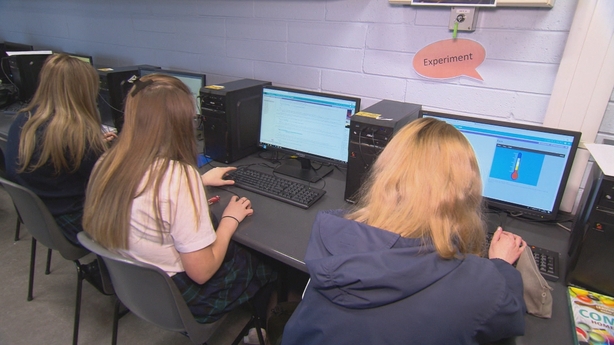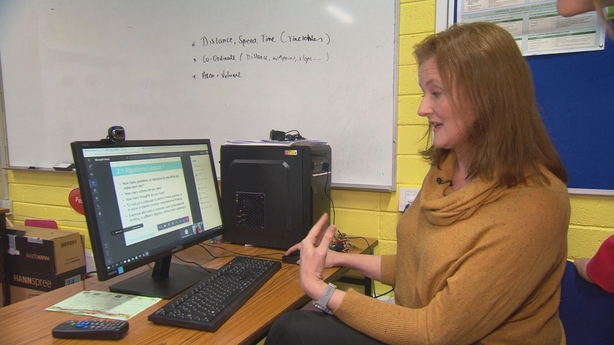When principal Marie-Therese Kilmartin comes to greet me in the entrance hall of Coláiste Bríde, the customary outstretched hand is missing.
We jokingly bump elbows and Marie-Therese, who is principal of this large urban girls secondary school, explains that the same etiquette will be at play at a parent teacher meeting to take place at the school this evening; parents have been contacted in advance and informed that there will be no shaking of hands.
Schools are adjusting to this new and strange reality.
Marie-Therese has spent the morning contacting parents about two planned school trips to Italy. Both unfortunately have been cancelled. Parents do not know as yet whether they will get refunds. Another planned school trip to Poland hangs in the balance.
But here at Coláiste Bríde and at schools throughout the country another bigger question is looming - what to do if they need to close.
The Department of Education has advised that schools should only shut down upon the specific guidance and direction of public health officials. Just a very small number of schools have closed so far, but the prospect of more closures, or even mass closures, is one that must be considered.
Coláiste Bríde is a tech savvy school. Like many others it already uses an online communication system for teaching and learning.
Teachers use the Outlook 365/Microsoft Teams online platform to email work to students. The platform allows them to use video too, and cloud-based class notebooks, to share and discuss information online.

For this school - as for others at second level - their key priority will be their sixth-year students who are facing into their Leaving Certificate exams.
Computer Science teacher Sarah-Jayne Carey talks me through how the online learning platform works. Every student has an email that connects them to the system and Sarah-Jayne can connect with all of her class at the same time. She can talk to them all with the video camera on or off as she pleases. She can share notes with them, look at their work, and they can ask her questions.
"I can say 'now you go off and do this exercise, come back to me this time tomorrow and we'll go through it and see have you any issues or problems with it'", Sarah-Jayne explains, "and that session is recorded so if they can't access it at that time they will be able to look back at it and have it as a resource".

Sixth-year students at the school are comfortable with the technology, but uncertainty is causing them additional stress. They wonder could the exams be postponed and they worry about practical work that has to be completed between now and June. Will that be affected, they ask.
"We're all a bit worried that the exams have to be pushed back" says Caitlin McMullen, "because if that happens then the results will be late and then starting college will be late, and everyone has plans for summer holidays, and jobs, and all that would be affected".
Students at Coláiste Bríde also express concern about self-discipline, should they be obliged to work from home.
"We might be more lazy to be honest" says sixth-year student Rosemary Belo, "because if we are at home we won't want to get out of bed, to study."
Her classmates agree. "In school we have the teachers constantly telling us we have to work and to study," says Kailey Aston, "but if we are at home it's just us. We will have to do it ourselves".
Kailey also worries that at home her five-year-old sister will prove a distraction.
These are all very real problems.

The advent of coronavirus has exposed social inequalities too. While students from more affluent backgrounds will be likely to have space and privacy at home, and a computer to work on, those from less well off families may struggle in overcrowded living conditions, and without a computer at home.
If schools and libraries are forced to close in an area - and that's an 'if' - what for example will a homeless student - who may be living in a hotel room with her or his family - do?
And then there is broadband provision. Coláiste Bríde is located in a part of the country with good broadband. But provision is poor or non-existent in some areas. If a school serving students who live in an isolated rural area with no broadband is obliged to close then cloud-based learning options are severely limited.
All these questions are hanging over the education system right now.
The Department of Education has confirmed that it is looking at contingency plans.
It says it is "continuing to examine how it will be needed to further support the education system in the coming weeks and months".
It has announced today arrangements for the payment of teachers if their school is forced to close or if they are obliged to self isolate as a result of Covid-19. Bodies such as the State Examinations Commission will also be preparing contingency plans, and watching developments very carefully.
As for this year's Leaving Cert students, the uncertainty is at best frustrating.
"We just want to get it over with now and get it done and get our marks", says Sixth Year student at Coláiste Bríde, Kamila Krukowska, "so this is stressing us out even more".
Read more: Coronavirus stories
We need your consent to load this rte-player contentWe use rte-player to manage extra content that can set cookies on your device and collect data about your activity. Please review their details and accept them to load the content.Manage Preferences







